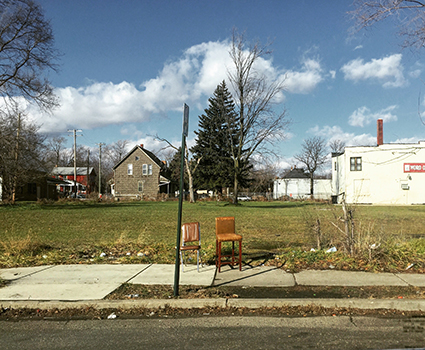Eve Avdoulos
Year submitted: 2018
Supervised by: Prof Wendy Pullan
Urban decline is often understood as the opposite of urban growth, yet this conceptualization is oversimplified, obscuring a genuine understanding of the social and spatial realities of the city today. Through the study of Detroit and, in particular, through a close reading of two residential neighbourhoods, this dissertation investigates the complexities of decline. It examines the development of decline over time, as well as how it has differentially affected social patterns and practices within the city. This dissertation approaches the topic by engaging with theoretical work on decline, as well as combining historical analysis with empirical evidence through extensive on-site research.
This work traces the historical development of Detroit from the beginning of the twentieth century through to the present day, focusing on the role of public policies, land-use patterns and infrastructural development in laying the foundations for urban decline. It challenges the accepted narrative of the cycle of ‘boom-bust-boom’, which views the city in terms of ‘growth-decline-recovery’, by illustrating how Detroit’s decline today is a resumption of various structural changes that were made during the city’s critical period of physical, economic and demographic growth.
This dissertation then investigates two contrasting neighbourhoods to illustrate the dynamic ways in which different areas of the city have been affected by, and responded to, decline: Brightmoor, the epitome of widespread decay and abandonment, and Grandmont Rosedale, a community of five neighbourhoods that has maintained relative stability. This analysis demonstrates how urban decline transforms the city—dismantling and disassembling existing spatial and social networks and infrastructures—while simultaneously creating new ones. It deviates from much of the current research that romanticises Detroit’s ruination by focusing instead on everyday urban life. Importantly, this dissertation argues that decline is not simply the opposite of growth, and therefore current scenarios speculating full recovery appear to be problematic.


